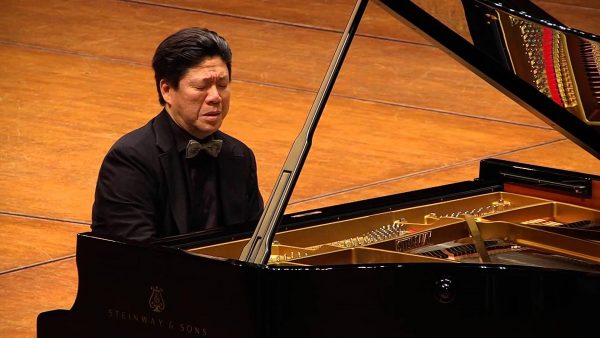Classical Concert Review: Pianist Meng-Chieh Liu — A Glorious Recital
By Susan Miron
A memorable evening, headlined by a superb pianist who deserves a full hall, any time, anywhere.

Pianist Meng-Chieh Liu. Photo: NEC.
Regardless of whether you knew the musician’s back story, pianist Meng-Chieh Liu‘s NEC faculty recital at Jordan Hall was out-and-out brilliant. He is celebrating his twenty-fifty year of teaching at Curtis Institute of Music with three recitals; alas, his performance here on Thursday evening was, sadly, sparsely attended. Those who did show up heard a stupendous pianist play a program book-ended by two Mozart piano concerti, with two wildly virtuosic pieces that one rarely hears performed live. It was a recital so stupendous that I resolved never to miss a local recital of his again.
The backstory makes “triumph over all odds” seem an understatement. In 2010, The Chicago Tribune told his story:
Once a competition-winning piano prodigy in his native Taiwan, Liu was embarking on a major performing career following graduation from Philadelphia’s Curtis Institute of Music some 15 years ago. Twenty-three at the time, he came down with a bad cough that soon morphed into something far more sinister. His hands grew stiff and he began losing weight and strength. Within months he could not walk unaided and barely could lift his limbs.
His doctors were perplexed. Neither the prescribed physical therapy nor chemotherapy could slow the advance of his mysterious malady. After Liu went into cardiac arrest and was put in intensive care at a hospital in Philadelphia, his ailment diagnosed as vasculitis, an exceedingly rare disorder of the immune system that inflames the victim’s vascular system. For six months he remained immobile in his hospital bed, his body shrunken to 90 pounds of skin over bone.
So atrophied were his hands, particularly his right hand, that, following a 1997 operation, he barely could depress the keys on an electronic keyboard.
“It was very difficult for me to imagine I would ever be able to play the piano again,” the pianist recalls.
Only after anti-cancer drugs were administered did his condition begin to improve. He put on weight and started to regain strength and flexibility. Two months after surgeons implanted a titanium nail to replace a withered tendon in his right index finger, he was practicing the piano again. What began as a plan to relearn the piano as an avocation turned into a crusade to relaunch his playing and teaching career.
I had heard Liu only once before and then, as now, I was very impressed, not only by his seemingly effortless (super) virtuosity, but by his deeply passionate playing. The Mozart Concerto No. 13 in C Major, K.415, made for a rarely-heard, heavenly concert opener. Instead of a small orchestra, Liu was accompanied by an excellent quintet of NEC graduate students — violinists Maria Ioudenich and Abigail Fayette, violist Tanner O. Menees, cellist Timotheos Petrin, and double bassist Justin Cheesman. Liu could easily be one of the best Mozart pianists I’ve heard. His was sparkling, soul-nurturing playing.
The next three pieces were chosen from the 12 Transcendental Etudes of Russian pianist/composer Sergei Lyapunov (1859-1924). This set of études, rarely performed because of their formidable difficulty, completed the cycle of the 24 major and minor keys that Franz Liszt had begun with his own Transcendental Études, but had left unfinished. Not only was Lyapunov’s set of études dedicated to the memory of Liszt (considered the greatest pianist of his time), but the final étude was specifically titled “Élégie en memoire de Franz Liszt.” Liu played “Berceuse” with spellbinding aplomb, made his way with confidence through the treacherous thickets of “Carillon,” and wowed with his performance of the thunderous, ultra- fast, and thrilling “Lesghinka.” I sat next to a friend with a score; just taking in all the notes visually was dizzying. What a splendid introduction to this composer!
After intermission, Liu gave a moving rendition of Isaac Albéniz’s (1860-1909) sublime “Iberia, Book One.” Of course, this is a work indelibly associated with the late pianist Alicia de Larrocha who, like Men-Chieh Liu, was also a brilliant Mozartian. Perhaps because of the composition’s close identification with de Larrocha, few pianists perform these four books of gorgeous music — and that’s unfortunate. They are wonderful pieces, and Liu gave them a magisterial performance. The first, “Evocación,” was played with endearing tenderness. “El Puerto,” with its lulling undertow (supplied by a hypnotic 6/8 rhythm), was a sensual delight. “El Corpus Christi in Sevilla” (in the French score, “Fete dies a` Seville”) built up to a series of exciting, startlingly powerful climaxes.
Finally, the superb Borromeo Quartet and bassist Justin Cheesman joined Liu for a glorious performance of Mozart’s beloved Piano Concerto No. 17 in G Major, K. 453, arranged for piano and strings (like the first concerto on this program) by Ignaz Lachner. One cannot ask for better chamber music partners than the Borromeos; this had the feeling, often, of a sextet rather than a concerto. First violinist Nicholas Kitchen’s playing was ebullient, and I enjoyed the interplay between him and Liu. (A future recording of some of the Mozart violin and piano sonatas would be most welcome by these two kindred spirits.) Liu’s performance was effervescent and jubilant; the strings were chock-full of personality. A memorable evening, headlined by a superb pianist who deserves a full hall, any time, anywhere.
Susan Miron, a harpist, has been a book reviewer for over 30 years for a large variety of literary publications and newspapers. Her fields of expertise were East and Central European, Irish, and Israeli literature. Susan covers classical music for The Arts Fuse and The Boston Musical Intelligencer.
